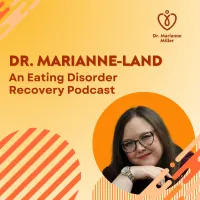Episode Description
What happens when the most painful wounds from childhood were not physical but verbal (or were both)?
In this solo episode, Dr. Marianne Miller explores how childhood verbal abuse shapes our relationship with food, body image, and self-worth. Words like "You're too much," "Are you really going to eat that?" or "You’d be pretty if you lost weight" do not just pass through us. They often take root and become beliefs that fuel restriction, binge eating, ARFID, and body distrust. These early messages are rarely named in traditional eating disorder care, yet they are at the center of how so many people learn to disconnect from their own needs.
This episode also takes a close look at intersectionality and how verbal abuse is often amplified when it lands on marginalized identities. Fat children, neurodivergent kids, BIPOC youth, disabled teens, and queer or trans kids often receive more frequent and more punishing verbal messages about food, emotions, and appearance. These experiences are not isolated. They are shaped by broader systems that devalue certain bodies and behaviors while demanding compliance and control. Dr. Marianne outlines how those messages become internalized and how they show up decades later in eating struggles that are often misunderstood or minimized by standard care.
Rather than framing recovery around food rules or rigid programs, this episode invites you to imagine a different path. One that centers truth, autonomy, compassion, and body liberation. Whether you are navigating ARFID, binge eating, restriction, or an unnameable discomfort with food, this conversation offers validation and a starting point for deeper healing.
WHAT YOU'LL HEAR IN THIS EPISODE-
The many forms verbal abuse can take in childhood
-
How shaming language around food and body shapes long-term eating patterns
-
Why intersectionality matters in recovery
-
How internalized shame drives disordered eating
-
Why traditional eating disorder treatment often fails marginalized clients
-
What a neurodivergent-affirming, sensory-attuned, liberation-focused approach looks like
This episode discusses verbal abuse, body shaming, disordered eating, and childhood trauma. Please care for your nervous system while listening. Take breaks, skip, or pause when needed.
THIS EPISODE IS FOR YOU IF . . .-
You were criticized or mocked for your body, eating habits, or emotions as a child
-
You live in a larger body or identify as neurodivergent, BIPOC, disabled, queer, or trans
-
You experience food restriction, binge eating, or fear-based eating
-
You are seeking eating disorder recovery that respects your lived experience
-
You want support that centers your nervous system and autonomy
- Childhood Trauma and Eating Disorders on Apple & Spotify.
- How Childhood Trauma Shapes Eating Disorders & Body Shame (Content Caution) on Apple & Spotify.
- Using EMDR & Polyvagal Theory to Treat Trauma & Eating Disorders with Dr. Danielle Hiestand, LMFT, CEDS-S on Apple & Spotify.
Dr. Marianne Miller is a Licensed Marriage and Family Therapist (LMFT) who works with teens and adults in California, Texas, and Washington, D.C. She specializes in trauma-informed eating disorder therapy that is sensory-attuned, neurodivergent-affirming, and centered on body liberation. Her clients often come to her after feeling dismissed or harmed by traditional treatment models. Many are working through ARFID, binge eating disorder, bulimia, anorexia, or mixed experiences that do not fit neatly into diagnostic boxes.
Dr. Marianne supports clients in larger bodies, those navigating chronic illness, sensory sensitivities, and those who live at the intersection of multiple marginalized identities. She believes recovery should not be about compliance or perfection. It should be about truth, autonomy, and building a relationship with food and body that is rooted in safety and dignity.
If you are seeking a therapist who will honor your complexity and offer support that aligns with your values, you can schedule a free 15-minute consultation call at:
👉 drmariannemiller.com
In this episode, you will hear conversations relevant to anyone searching for a neurodivergent-affirming therapist for eating disorders, trauma-informed ARFID therapy in California, Texas, or Washington D.C., support for binge eating and body shame, or eating disorder therapy for marginalized communities. This episode includes key themes like internalized shame and food, fat liberation in recovery, body trust, verbal abuse and disordered eating, sensory-attuned care, and the role of systemic harm in eating struggles.
